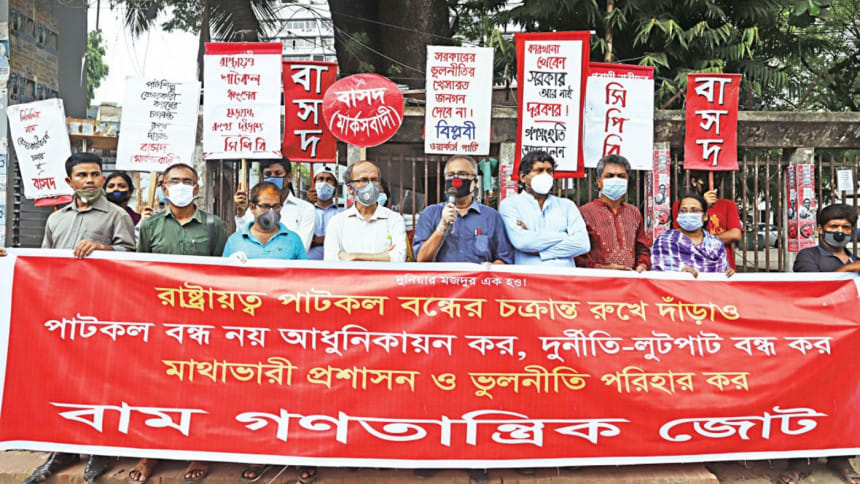End of state-owned jute mills: why close when you can reform?

So it's official now. The government is going to shut down all 25 state-owned jute mills operated by Bangladesh Jute Mills Corporation (BJMC) and lay off about 25,000 workers involved with them. The prime minister approved the decision on Thursday, according to UNB, putting an end to speculations following an announcement by the textiles and jute minister to that effect last Sunday. Unless there is a reversal of decisions which is unlikely at this point, we're going to witness a historic moment for Bangladesh's jute industry, although it's not the one we were promised, nor can we let it pass without proper scrutiny of what has led to this moment and what we could have done to avoid it.
Here's what we know so far: the wages and benefits of all current workers (24,886) and the dues of 8,956 already retired workers of those jute mills will be paid within "the quickest possible time", said the principal secretary to the prime minister. A Tk 5,000-crore fund will be allocated for this purpose. On average, each worker will get Tk 13.86 lakh, and the payments will be made directly to their bank accounts. As for the future of the laid-off workers, we are told that they would be trained and "given priority" in recruitment to the mills when they are "modernised" and "reopened" under Public-Private Partnerships, or some other joint ventures, or through leasing out to third parties. Details in that department are still a little sketchy.
The official narrative pins the blame for the present situation on BJMC's lack of profitability, saying it had recorded a cumulative loss of Tk 10,674 crore from 1972 until 2018-19 and cannot be viable in the face of competition from private mills. This is no doubt a huge red flag for any industry, especially in the middle of a pandemic when even profit-making industries are struggling. But what the officials have conveniently glossed over is the reason behind this turn of events. BJMC may have been a rudderless ship but it's not unmanned. It's run by real people, who have let it rot in a bottomless pit of corruption, mismanagement, lack of coordination, inefficiencies, and so on.
So what we are not being told is that loss or lack of profitability, as an excuse for outsourcing production to the private sector, is just a semantic sleight of hand to let these people and their enablers off the hook. We've heard the same excuse peddled in the past, trying to justify occasional closure or privatisation of some mills. We have heard it when the workers went on hunger marches to demand their dues. Lack of profitability is a long-worn-out excuse by now, and it's frightening that it would be used to pass death sentence to a sector that, if properly run, has so much to offer to this nation.
Jute is called "golden fibre" not just because the fibre is golden. It's called so because it also offers a golden opportunity to turn our economy around. Jute is the second most important natural fibre in terms of global consumption after cotton, and Bangladesh has ample to offer. The country's jute manufacturing sector, one of its oldest traditional manufacturing sectors, emerged in erstwhile East Pakistan in the early 1950s, with the founding of Adamjee Jute Mills. During the 1960s and 1970s, this sector accounted for a major share of the national income. In May 1972, after Bangladesh became independent, the government nationalised the industry to streamline exports. Ironically, the main reason cited for this move was to "check corruption" in the sector and ensure fair prices for jute producers. In 1973, its contribution in the overall national export was 89.9 percent. It was a golden time for the golden fibre.
In the 1980s, however, it began to lose its lustre, after synthetic materials like polythene and plastics were introduced. This led to a gradual decline in its share of the national export, overall foreign exchange earnings and the Gross Domestic Product (GDP). The rise of the RMG sector, regressive policies of successive governments and the push for privatisation were also responsible for the decline. Adamjee Jute Mills was closed down in 2002. Today, as far as public policies go, jute exists as a glorified relic from the past. After a brief period of euphoria over the promulgation the Mandatory Jute Packaging Act, 2010, which paved the way for compulsory use of jute packaging for 17 products, things have come full circle, culminating with the closure of all state-owned jute mills in one fell swoop.
The history of jute in independent Bangladesh is thus one of unutilised potential and unfulfilled promises. From the wholesale nationalisation in 1972 to the wholesale denationalisation in 2020, the trajectory of the industry shows not just its declining appeal or performance through the years. It's also, importantly, an indictment of the stop-start approach of successive governments that either did too much or too little, ignoring the long-term consequences of their action. So it's little wonder that they have chosen an easy exit when push came to shove, instead of taking up the strenuous task of reforming it from the ground up.
The official narrative about closing and "reopening" the mills under private arrangements and reemploying the workers raises some questions: how can the workers trust this promise when there is a well-documented history of the authorities failing to give them their rightful dues or break the all-powerful hold of syndicates over this industry? What guarantee do they have that their dues will be paid in full or they will be given proper wages in the privatised mills? Can denationalisation eradicate the culture of corruption and mismanagement so entrenched in the industry? Why were the calls for modernisation to make those mills profitable ignored when it is obvious that it would have cost the government a lot less than its Tk 5,000-crore settlement package? Why did the government take this decision especially when there are signs that jute is making a comeback finally?
The last point is particularly significant. According to data from the Export Promotion Bureau (EPB), exports of jute and jute products increased by about 4 percent in the first 11 months of FY 2019-2020. During the same period, exports of readymade garments declined by about 19 percent and exports of leather goods declined by about 22 percent. In the process, the jute sector surpassed leather to take the second place in Bangladesh's overall export trade. Meanwhile, the RMG bloodbath continues apace as global buyers withdraw orders or refuse to pay the manufacturers. Many migrant workers have already returned to Bangladesh after losing their jobs in the pandemic, making a big dent in its remittance earnings. Experts say in these difficult and changing times, sectors like livestock, jute, and agriculture can play a major role in our economic recovery. Why, then, is this regressive move to close so many jute mills at once which may set us back years, if not decades?
It's worth noting that in recent years there has been a resurgence of interest in jute globally, thanks to the rise in environmental awareness and greening strategies being adopted to combat climate change. In the coming days, there will be a huge demand for jute products and Bangladesh can be a global leader in this sector. The private mills are stepping up to the task as best as they can but we need those 25 public mills to be up and running again. We need them to be refurbished with modern equipment to start making profits. And we need those laid off workers to be back in the game, both for their sake and the sake of the country. Proper strategies, efficient management and diversified jute goods are key to success in this scenario.
The jute industry stands at a crossroads—we need to choose our next path very carefully.
Badiuzzaman Bay is a member of the editorial team at The Daily Star. Email: [email protected]

 For all latest news, follow The Daily Star's Google News channel.
For all latest news, follow The Daily Star's Google News channel. 



Comments